
No data
Do you want to know which is the better broker between FXTM and Plus500 ?
In the table below, you can compare the features of FXTM , Plus500 side by side to determine the best fit for your needs.
EURUSD: -0.2
XAUUSD: 0.3
Long: -7.62
Short: 1.97
Long: -40.54
Short: 20.56
You can determine the reliability and credibility of a broker by checking four factors:
1.Forex broker introduction。
2.Are the transaction costs and expenses of fxtm, plus500 lower?
3.Which broker is safer?
4.Which broker provides better trading platform?
Based on these four factors, we can compare which is reliable. We have broken down the reasons as follows:
| FXTM | Basic Infromation |
| Registered Country/Region | United Kingdom |
| Founded in | 2011 |
| Headquarters | Cyprus, UK, Belize |
| Regulated By | FCA, CySEC, FSCA (Out of Scope Business) |
| Minimum Deposit | $10 |
| Leverage | Up to 1:2000 |
| Account Types | Micro, Advantage, and Advantage Plus |
| Demo Account | Yes |
| Trading Instruments | Forex, Commodities, Indices, Shares, Cryptocurrencies |
| Trading Platforms | MetaTrader 4, MetaTrader 5, FXTM Trader |
| Mobile Trading | Yes |
| Islamic Account | Yes |
| Payment Methods | Credit/Debit Cards, Bank Wire, E-wallets |
| Minimum Spread on EUR/USD | From 0.1 pips |
| Customer Support | 24/5 Live Chat, Email, Phone |
| Educational Resources | Yes |
| Negative Balance Protection | Yes |
FXTM, or Forex Time, is a global forex and CFD broker founded in 2011. The company is headquartered in Cyprus and is regulated by the Financial Conduct Authority (FCA) in the UK, the Cyprus Securities and Exchange Commission (CySEC), and other regulatory bodies in various countries. FXTM offers a variety of trading instruments, including forex, commodities, indices, shares, and cryptocurrencies.
FXTM is its extensive range of account types, which cater to traders of all experience levels and preferences. The broker offers five different account types, including the Micro, Advantage, and Advantage Plus accounts, as well as demo accounts and Islamic accounts. Each account type comes with its own unique features, including different leverage options, spreads, and minimum deposit requirements. In terms of trading fees, FXTM offers variable spreads on most of its instruments, with spreads starting from as low as 0.1 pips.
FXTM also offers a range of trading platforms, including the popular MetaTrader 4 (MT4) and MetaTrader 5 (MT5) platforms. These platforms are available in desktop, web, and mobile versions, allowing traders to trade on the go and from anywhere in the world.
Lastly, FXTM provides customer support in multiple languages, which is available 24/5 via live chat, email, and phone. The broker also offers a range of educational resources, including webinars, seminars, and trading guides.
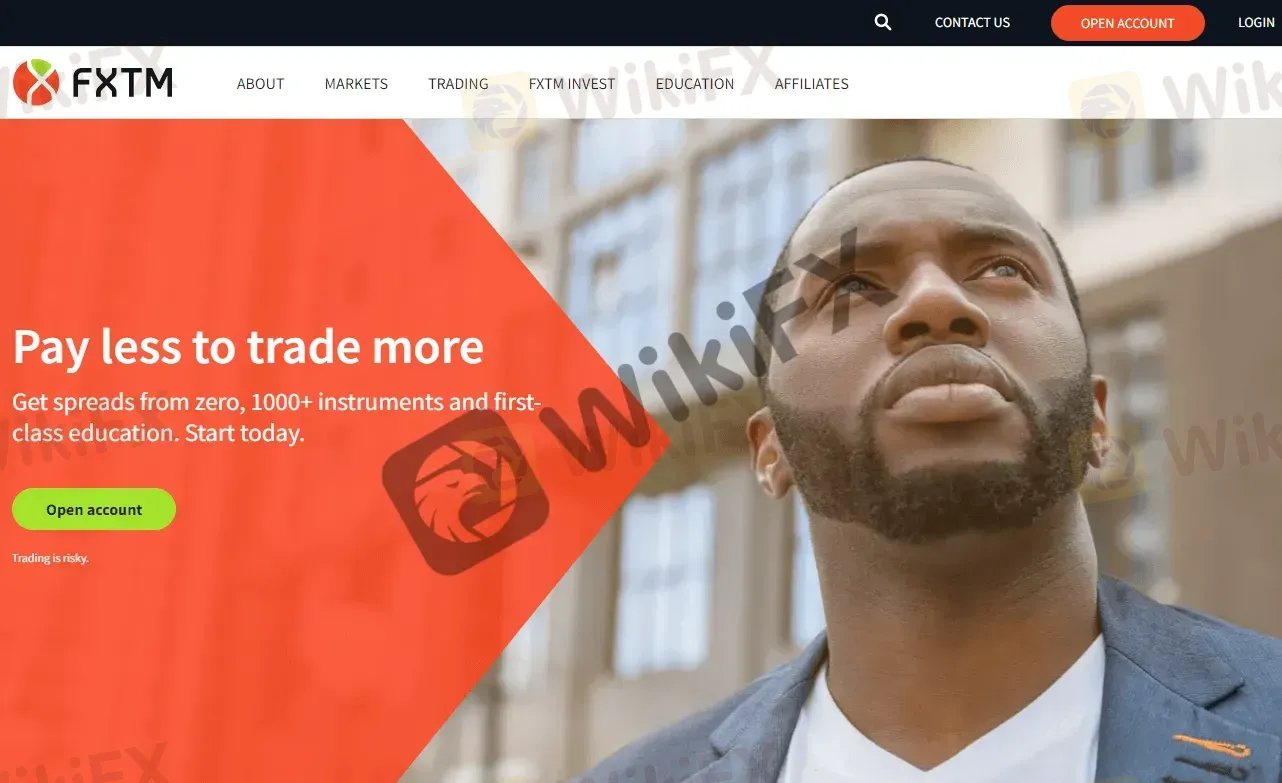
FXTM is currently regulated by two reputable regulatory bodies, the Financial Conduct Authority (FCA) in the UK and the Cyprus Securities and Exchange Commission (CySEC) in Cyprus. These regulatory bodies ensure that the broker operates within strict guidelines and rules.
Forextime Ltd (Its CYSEC entity), is authorized and regulated by the Cyprus Securities and Exchange Commission (CYSEC) under regulatory license number 185/12.
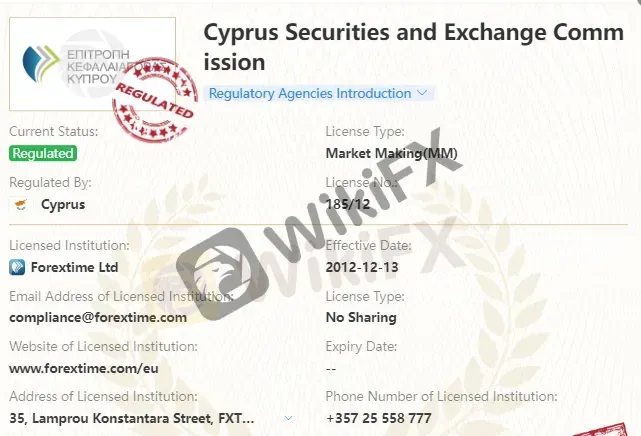
Exinity UK Ltd, its UK entity, is authorized and regulated by the Financial Conduct Authority (FCA) under regulatory license number 777911.
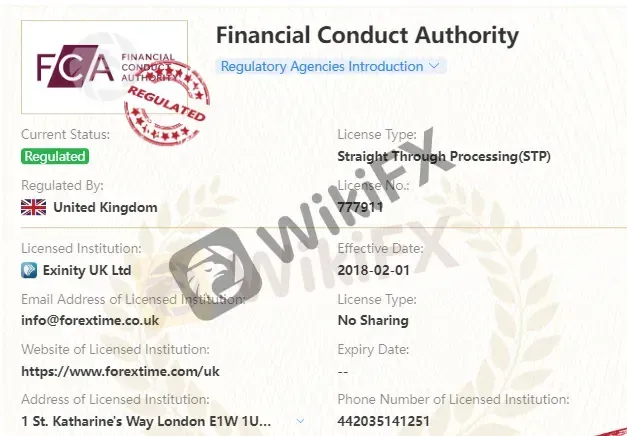
FOREXTIME LTD is authorized by the Financial Conduct Authority (FSCA), holding a license of Financial Service Authority under license no. 46614.
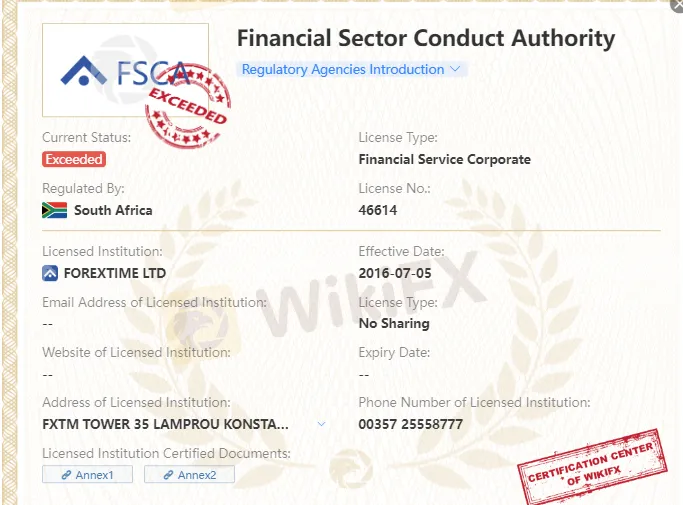
FXTM is a well-known broker that offers a range of trading services to its clients, including forex, commodities, and CFDs. While there are many benefits to trading with FXTM, there are also some drawbacks to consider. In this table, we'll take a closer look at the pros and cons of trading with FXTM, so you can make the right choice about whether this broker is right for you. Some of the pros we'll cover include their range of account types, competitive spreads, and excellent customer support, while some of the cons we'll discuss include the lack of cryptocurrency trading and high withdrawal fees.
| Pros | Cons |
| Regulated by top-tier financial authorities, FCA and CYSEC | Limited product offerings compared to some competitors |
| Wide range of account types for different trading needs | High inactivity fee |
| Low minimum deposit requirements | Limited payment methods |
| Demo Accounts Available | Limited research tools and resources |
| Islamic Accounts Available | |
| Access to a variety of trading platforms, including MT4 and MT5 | |
| Multiple funding and withdrawal options | |
| Rich Eductaional Resources | |
| Rich Trading Tools | |
| High-quality customer support |
FXTM offers a diverse range of trading instruments for its clients, which includes forex, spot metals, CFD commodities, stock, stock CFDs, and CFDs on indices. The forex market is the largest financial market in the world, and FXTM provides access to a wide range of major, minor and exotic currency pairs. This means that traders have the flexibility to trade the currency pairs that best suit their trading strategies.
In addition to forex, FXTM offers trading in spot metals, which include gold, silver, and platinum. Spot metals can be a useful tool for diversifying a portfolio or hedging against inflation or geopolitical risks. FXTM also provides CFD trading in commodities, such as oil, natural gas, and agricultural commodities. CFD trading allows traders to speculate on the price movements of these commodities without having to own them physically.
FXTM also offers trading in stocks and stock CFDs. With access to global markets, traders have the opportunity to invest in some of the world's leading companies, such as Apple, Amazon, and Facebook. Moreover, traders can benefit from dividend payments when holding stock CFDs for the long term.
Finally, FXTM provides CFD trading on indices, which allows traders to speculate on the performance of a particular stock market. This is particularly useful for traders who want to take a broader view on the direction of a market, rather than focusing on individual stocks.
Overall, FXTM's range of market instruments provides traders with a wide variety of opportunities to diversify their trading portfolio and explore new trading strategies.

| Pros | Cons |
| Offers a wide range of markets to trade, including forex, spot metals, and CFDs on commodities, stocks, and indices | Limited selection of individual stocks compared to some competitors |
| Competitive spreads and commissions | Margin requirements on some instruments may be higher than other brokers |
| Access to both major and minor forex pairs, as well as exotic currency pairs | Limited cryptocurrency offerings compared to some competitors |
| Opportunity to diversify portfolio with a variety of markets | The number of CFDs on commodities may be limited compared to other brokers |
| Offers both MetaTrader 4 and MetaTrader 5 platforms for trading | Availability of certain markets may vary depending on the trader's location |
FXTM offers three different types of trading accounts, which are the Micro account, the Advantage account, and the Advantage Plus account. The Micro account requires a minimum deposit of $10, the Advantage account requires a minimum deposit of $100, and the Advantage Plus account requires a minimum deposit of $500.These account types are designed to cater to the varying needs and preferences of traders, ranging from beginner traders with limited capital to experienced traders looking for more advanced trading features. Each account type has its own unique features and benefits, such as different minimum deposit requirements, leverage ratios, and spreads, allowing traders to choose the one that suits them best. The Micro account is ideal for novice traders with a limited budget, while the Advantage account is suitable for experienced traders who require advanced trading tools and a competitive trading environment. The Advantage Plus account is designed for professional traders who require high-volume trading and personalized support from a dedicated account manager.
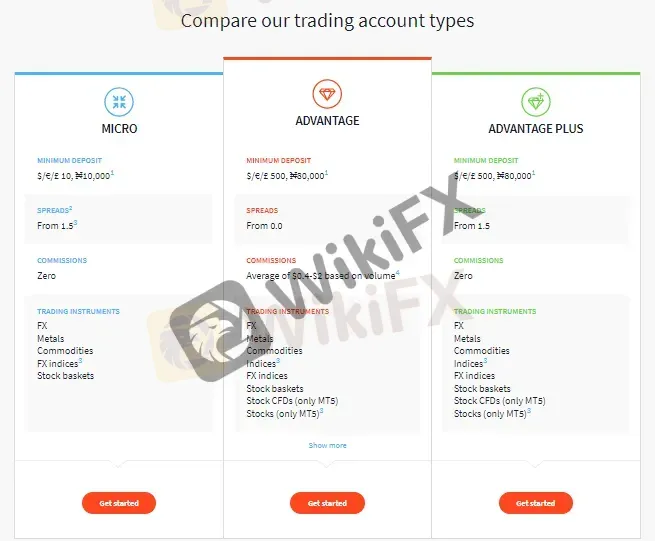
| Pros | Cons |
| Micro account has low initial deposit | Micro account has higher spreads compared to other types |
| Advantage account has low spreads | Advantage account has a higher minimum deposit |
| Advantage Plus account offers lower commissions | Advantage Plus account has the highest minimum deposit |
FXTM offers demo accounts for all its account types, including Micro, Advantage, and Advantage Plus. These demo accounts allow traders to test their trading strategies in a risk-free environment using virtual funds. Demo accounts are also useful for new traders who want to learn how to trade before committing real money to live trading. With FXTM's demo accounts, traders can access all the trading tools and features available in the live trading platform. The demo accounts are also available in multiple languages, making it accessible for traders from different countries. However, it's important to note that demo trading doesn't completely simulate the emotional and psychological aspects of real trading, which could affect a trader's performance in the live markets.

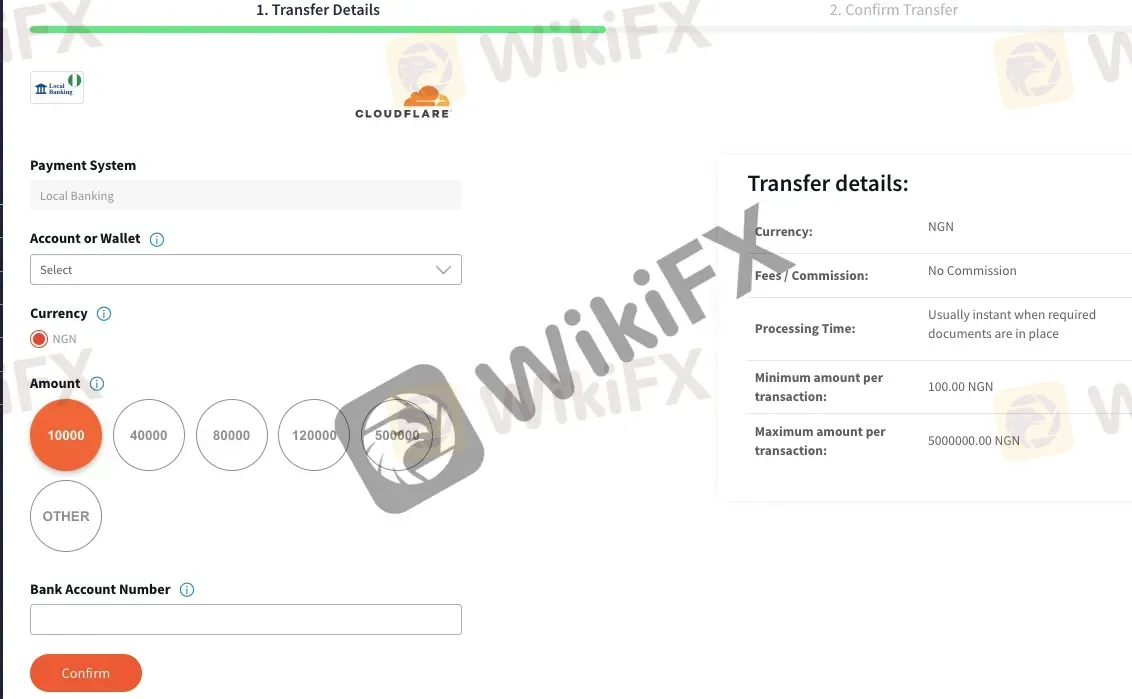
To open an account with FXTM, you first need to visit their website and click on the “OPEN ACCOUNT” button on the top right-hand corner of the page.
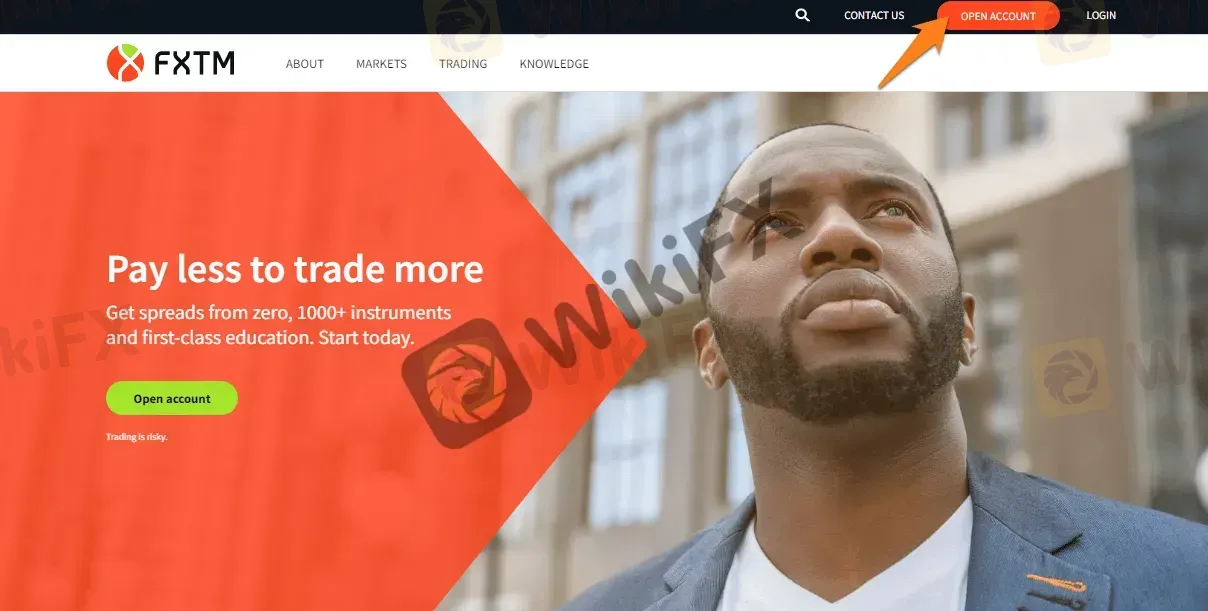
This will take you to the account registration page where you will need to fill out some basic personal information like your name, email address, and phone number.
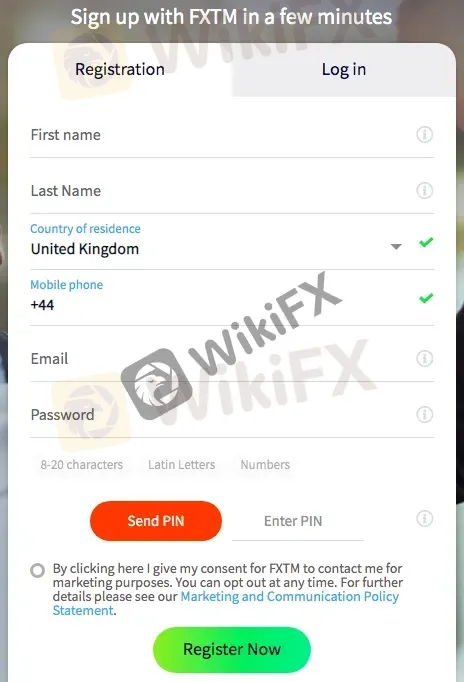
Next, you will be asked to choose the type of account you want to open. FXTM offers three main account types - Micro, Advantage, and Advantage Plus, each with its own features and benefits. You will also need to select the base currency of your account and agree to the terms and conditions of the broker.
Once you have selected your account type and base currency, you will be prompted to provide some additional personal information like your date of birth, occupation, and address. You will also need to answer a few questions about your trading experience and investment goals.
After you have completed the registration process, you will need to verify your account by providing some additional documents like a copy of your ID or passport and a proof of address like a utility bill or bank statement.
Finally, once your account is verified, you can then make your first deposit and start trading.
FXTM offers leverage of up to 1:2000, depending on the account type and trading instrument. The highest leverage is available for forex trading on the FXTM Pro account, while the other account types offer leverage up to 1:30 for EU traders and up to 1:2000 for non-EU traders. It's important to note that while high leverage can increase potential profits, it also increases the risk of losses. Therefore, it's recommended to use leverage wisely and only trade with funds you can afford to lose. FXTM also offers negative balance protection, which ensures that traders can not lose more than their account balance. This feature can provide additional peace of mind when trading with high leverage.
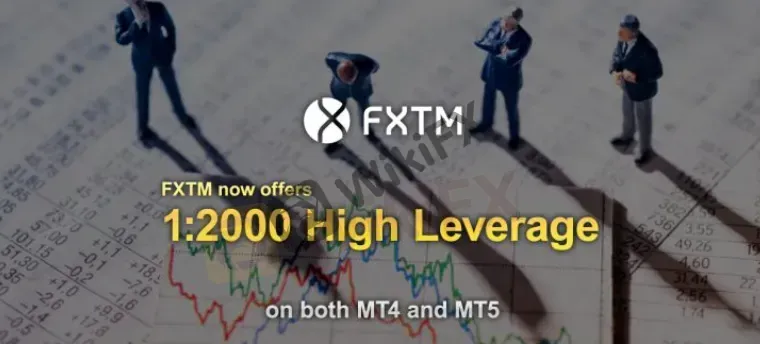
The spreads and commissions vary depending on the account type. For the Micro account, the spreads start from 1.5 pips, and no commission is charged. For the Advantage account, the spreads start from 1.1 pips, and a commission of $2 is charged per lot. For the Advantage Plus account, the spreads start from 0.0 pips, and a commission of $4 is charged per lot. It's important to note that the spreads are floating and may widen during periods of high market volatility.
The spreads offered by FXTM are typically lower than those offered by many other brokers in the industry, particularly on the Advantage and Advantage Plus accounts. The Micro account, however, has slightly higher spreads, which is to be expected due to the smaller minimum deposit requirement.
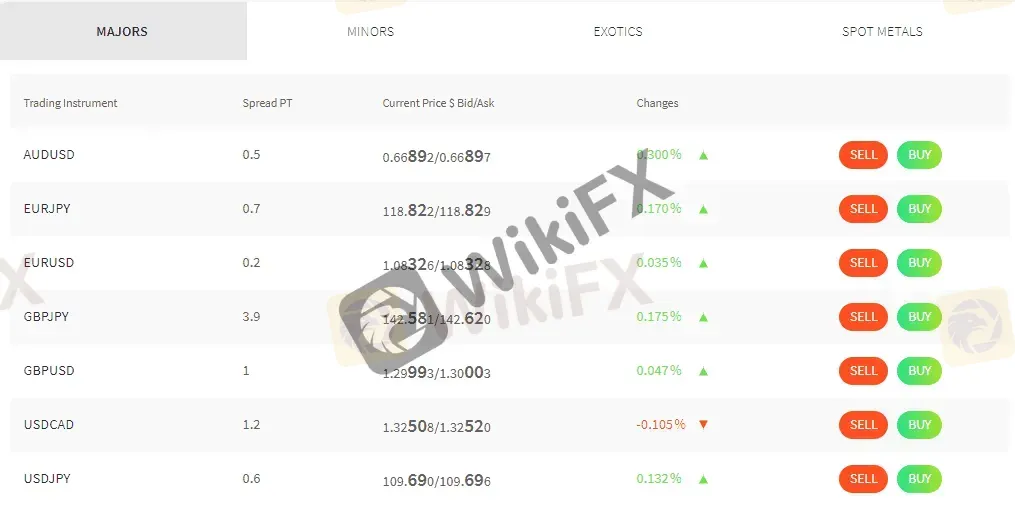
Here we have created a comparison table of the average spreads and commissions offered by FXTM and some other popular forex brokers such as IC Markets, Exness, and FP Markets:
| Broker | EUR/USD Spread | Commission | Minimum Deposit |
| FXTM (Micro) | 1.5 pips | No commission | $10 |
| FXTM (Advantage) | 0.5 pips | No commission | $100 |
| FXTM (Advantage Plus) | 0.1 pips | No commission | $500 |
| IC Markets (Raw Spread) | 0.1 pips | $7 round turn | $200 |
| Exness (Raw Spread) | 0.3 pips | No commission | $1 |
| FP Markets (Raw Spread) | 0.0 pips | $7 round turn | $100 |
Apart from trading fees, FXTM charges some non-trading fees that traders should also consider before choosing this broker. Some of the non-trading fees charged by FXTM include inactivity fee, withdrawal fee, deposit fee, and overnight fee. The inactivity fee is charged when a trader does not perform any trading activity on their account for a period of 6 months. The fee charged is $5 per month. Withdrawal fees vary depending on the method used, with bank transfers attracting a higher fee compared to e-wallets. Deposit fees are not charged for most methods, but a 2.5% fee is charged when depositing via Neteller. Overnight fees are charged when a position is held open overnight, and they vary depending on the instrument being traded
Here is a table showing the comparison of non-trading fees charged by FXTM and some other popular forex brokers:
| Broker | Inactivity Fee | Deposit Fee | Withdrawal Fee |
| FXTM | $5/month after 6 months of inactivity | Free | Fees may occur |
| Avatrade | $50/quarter after 3 months of inactivity | Free | Fees may occur |
| IC Markets | $0 | Free | Fees may occur |
| Exness | $0 | Free | Fees may occur |
| FP Markets | $0 | Free | Fees may occur |
FXTM offers a range of trading platforms, including the popular MetaTrader 4 and 5 platforms, as well as their proprietary trading platform called FXTM Trader. The MetaTrader 4 and 5 platforms are known for their ease of use, comprehensive charting tools, and customizability, while FXTM Trader offers advanced features such as price alerts, multiple chart types, and a news feed.
One of the main advantages of using MetaTrader 4 and 5 is the vast community of traders who have developed and shared custom indicators and trading strategies, making it easy to find and use powerful tools that can help improve your trading performance.
Another advantage of FXTM's trading platforms is their compatibility with a range of devices, including desktop, mobile, and web-based platforms, making it easy to trade on the go or from any device.

Here's a table comparing the trading platforms offered by FXTM, IC Markets, Avatrade, and Exness
| Broker | Platform Types | Desktop | Web-Based | Mobile |
| FXTM | MT4, MT5, FXTM Trader | ✔ | ✔ | ✔ |
| IC Markets | MT4, MT5, cTrader | ✔ | ✔ | ✔ |
| Avatrade | MT4, AvaTradeGO, WebTrader | ✔ | ✔ | ✔ |
| Exness | MT4, MT5 | ✔ | ✔ | ✔ |
FXTM offers a variety of deposit and withdrawal options for its clients. Traders can deposit funds into their trading account using credit/debit cards, bank wire transfers, e-wallets, and other online payment methods. The minimum deposit amount varies depending on the account type selected by the trader.
For credit/debit card deposits, FXTM accepts Visa, Mastercard, and Maestro. There are no deposit fees for credit/debit card transactions, and funds are usually credited to the trading account instantly.
Bank wire transfers are also available as a deposit option. This method takes longer to process compared to other deposit methods and may incur charges from the bank. The minimum deposit amount for bank wire transfers varies depending on the currency selected, and it may take up to five business days for funds to appear in the trading account.
E-wallets such as Skrill, Neteller, and WebMoney are also accepted by FXTM. Deposits made through e-wallets are usually credited to the trading account instantly and are free of charge. The minimum deposit amount for e-wallet transactions varies depending on the selected e-wallet.
Withdrawals can be made using the same methods as deposits, with the exception of Mastercard. Withdrawals made through credit/debit cards may take up to three business days, while withdrawals made through e-wallets are usually processed within 24 hours. Bank wire transfers may take up to five business days for the funds to be credited to the trader's bank account.
FXTM may charge withdrawal fees for some methods. Traders are advised to check the fees and processing times associated with each method before making a deposit or withdrawal.
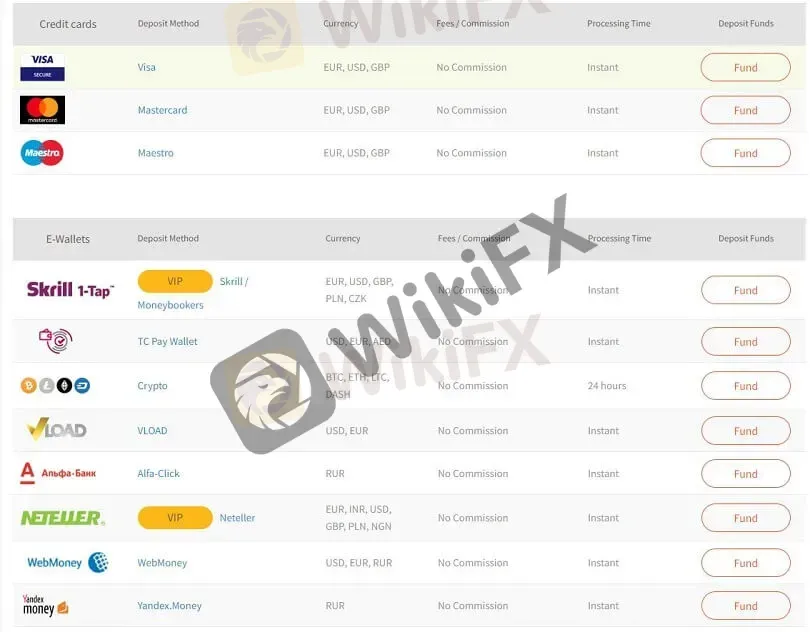
| Pros | Cons |
| Multiple deposit and withdrawal methods | Some withdrawal methods may have higher fees |
| No deposit fees | Minimum withdrawal amounts may be higher than other brokers |
| Fast deposit and withdrawal processing times | Some deposit methods may not be available in certain regions |
| Supports various currencies for transactions |
FXTM is known for providing excellent customer support to its clients. The broker offers various channels for clients to contact their support team, including live chat, email, and phone support. The customer support team is available 24/5 and is multilingual, which means clients can communicate with them in their preferred language.
FXTM also provides an extensive FAQ section on their website that covers various topics, such as account opening, deposit and withdrawal methods, trading platforms, and more. This section is helpful for clients who prefer to find answers to their questions without contacting the support team.
| Pros | Cons |
| Live chat support available | No 24/7 customer support |
| Fast response times | No phone support for some countries |
| Knowledgeable and helpful staff | Limited educational resources for clients |
| Various support channels available | |
| A FAQs section |
FXTM offers various educational resources to its clients to enhance their trading skills and knowledge. These resources include webinars, seminars, articles, e-books, educational videos, and more.
Webinars and seminars are live sessions conducted by market experts and analysts who provide insights and analysis on market trends and trading strategies. The sessions cover a wide range of topics, including technical and fundamental analysis, risk management, and trading psychology. The webinars and seminars are interactive, allowing clients to ask questions and get feedback from experts.
FXTM also provides a wide range of educational articles and e-books that cover a variety of trading topics. These resources are available to all clients, regardless of their account type, and can be accessed on the FXTM website.
In addition to these resources, FXTM offers educational videos that cover various aspects of trading, including market analysis, trading strategies, and risk management. These videos are designed to be engaging and informative, making them a useful tool for traders at all levels of experience.
| Pros | Cons |
| Wide range of educational resources available | Some resources may be outdated or not relevant |
| Multiple formats available (webinars, articles, etc.) | Limited in-depth educational resources |
| Demo account available for practice trading | Educational resources may not be suitable for all levels of traders |
| Educational resources available in multiple languages | Some resources may require a subscription or additional fees |
FXTM is a well-regulated and respected forex broker with a wide range of market instruments, competitive trading conditions, and user-friendly trading platforms. They offer various account types with reasonable minimum deposits and leverage options. FXTM's customer support is also responsive and helpful, while their educational resources can be useful for both novice and experienced traders.
However, there are also some potential drawbacks to consider. FXTM's non-trading fees, such as withdrawal fees, can be high, and their spreads can be wider than some of their competitors. Additionally, some traders may find their educational resources lacking in depth or variety.
Q: Is FXTM regulated?
A: Yes, FXTM is regulated by top-tier financial authorities such as the Financial Conduct Authority (FCA) in the UK and the Cyprus Securities and Exchange Commission (CySEC).
Q: What trading instruments are available on FXTM?
A: FXTM offers a range of trading instruments including forex, spot metals, CFD commodities, stock CFDs, and CFDs on indices.
Q: What types of trading accounts are available on FXTM?
A: FXTM offers three main types of trading accounts: the Micro account, Advantage account, and Advantage Plus account.
Q: What is the minimum deposit required to open an account on FXTM?
A: The minimum deposit required for each account type on FXTM is as follows: Micro account - $10, Advantage account - $100, and Advantage Plus account - $500.
Q: What trading platforms are available on FXTM?
A: FXTM offers a range of trading platforms including the popular MetaTrader 4 (MT4) and MetaTrader 5 (MT5) platforms.
Q: What are the deposit and withdrawal options on FXTM?
A: FXTM offers a variety of deposit and withdrawal options including bank transfers, credit/debit cards, and e-wallets such as Skrill, Neteller, and more.
Q: What are the deposit and withdrawal options on FXTM?
A: FXTM offers a variety of deposit and withdrawal options including bank transfers, credit/debit cards, and e-wallets such as Skrill, Neteller, and more.
| Plus500 Review Summary of 10 Points | |
| Founded | 2008 |
| Headquarters | Israel |
| Regulation | FCA, CySEC, ASIC, FMA, MAS |
| Market Instruments | forex, cryptocurrencies, stocks, indices, commodities, and options |
| Demo Account | Available |
| Leverage | 1:30 (forex), 1:20 (indices), 1:10 (commodities), 1:2 (cryptocurrencies), 1:5 (stocks) |
| EUR/USD Spread | 0.5 pips |
| Trading Platforms | own proprietary trading platform (desktop, web, and mobile) |
| Minimum deposit | $/€/£100 |
| Customer Support | 24/7 email, WhatsApp and live chat |
Plus500 is an online trading platform that offers Contracts for Difference (CFDs) on a range of financial instruments including stocks, forex, commodities, cryptocurrencies, options, and indices. The platform was founded in 2008 and is headquartered in Israel, with additional offices in the UK, Cyprus, Australia, and Singapore. Plus500 is authorized and regulated by several financial authorities, including the Financial Conduct Authority (FCA) in the UK, the Cyprus Securities and Exchange Commission (CySEC) in Cyprus, and the Australian Securities and Investments Commission (ASIC) in Australia. The platform is available in more than 50 countries and supports over 30 languages.
Plus500 is a CFD (Contracts for Difference) broker, which means that it offers trading on derivatives based on various financial assets without actually owning the underlying assets. Traders can speculate on the price movements of assets such as stocks, forex, commodities, cryptocurrencies, and indices without having to buy or sell the assets themselves. As a CFD broker, Plus500 allows traders to take both long and short positions, and offers leverage which can increase potential profits (and losses).
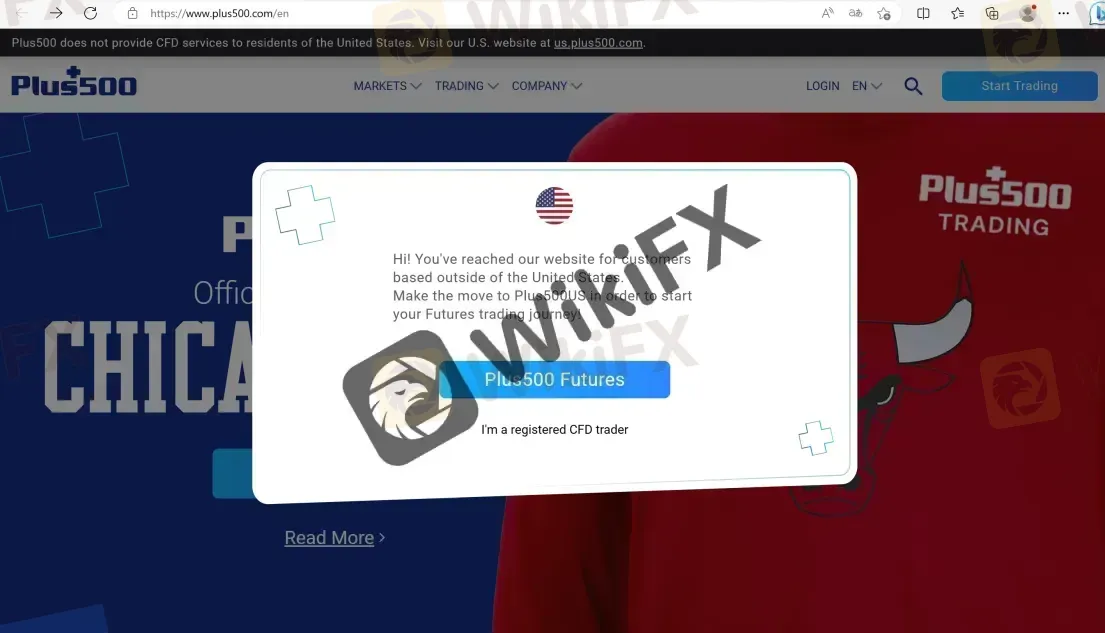
Plus500 is a good option for traders looking for a user-friendly platform to trade a wide range of markets and instruments, with competitive spreads and no commissions.
However, traders who require advanced charting tools, educational resources, and alternative trading platforms may need to consider other brokers.
| Pros | Cons |
| • Simple and easy-to-use trading platform | • Limited product offering |
| • Commission-free trading | • Limited research and educational tools |
| • Tight spreads | • No support for MetaTrader platform |
| • Negative balance protection | • Limited customer support options |
| • Regulated by reputable financial authorities | • No phone support |
| • Free demo account | • Withdrawal fees for some payment methods |
| • Limited trading tools and features |
Note that the information presented in the table is based on general observations and may vary depending on individual circumstances and preferences.
There are many alternative brokers to Plus500, and the best one for you will depend on your individual trading needs and preferences. Here are some popular alternatives to Plus500:
eToro: eToro is a social trading platform that allows you to copy the trades of other traders. It offers a wide range of trading instruments and has a user-friendly platform.
IG: IG is a well-established broker that offers a wide range of trading instruments, including forex, stocks, and commodities. It also offers a range of educational resources and has a user-friendly platform.
XM: XM is a popular broker that offers competitive spreads and a range of trading instruments, including forex, stocks, and commodities. It also offers a range of educational resources and has a user-friendly platform.
Pepperstone: Pepperstone is a popular broker that offers competitive spreads and a range of trading instruments, including forex, stocks, and commodities. It also offers a range of educational resources and has a user-friendly platform.
IC Markets: IC Markets is a popular broker that offers competitive spreads and a range of trading instruments, including forex, stocks, and commodities. It also offers a range of educational resources and has a user-friendly platform.
It's important to do your own research and compare the features and fees of different brokers before making a decision.
Plus500 is considered legitimate as it is authorized and regulated by several top-tier financial authorities, including the UK's Financial Conduct Authority (FCA) and the Australian Securities and Investments Commission (ASIC). Plus500 is also publicly traded on the London Stock Exchange, which provides additional transparency and accountability. The broker has been in operation since 2008 and has a large and established customer base. However, it is worth noting that no broker is entirely risk-free, and traders should always do their own due diligence before depositing funds with any broker.
Plus500 takes several measures to ensure the safety and protection of its clients, and the fact that it is a regulated broker provides additional reassurance to clients. Here is a table outlining how Plus500 protects its clients:
| Protection Measure | Detail |
| Segregated Funds | Client funds are kept separate from company funds |
| Negative Balance Protection | Clients can't lose more than their account balance |
| Risk Management Tools | Stop loss, limit order and other tools to help manage risk |
| Account Verification | Rigorous account verification process to prevent fraud and unauthorized access |
| SSL Encryption | Secure Socket Layer (SSL) encryption used for all communication and data transfer |
| Regulatory Oversight | Regulated by multiple reputable financial authorities |
| Investor Compensation Fund | Eligible clients may receive compensation in the event of insolvency or bankruptcy |
Note: This table provides a brief overview of Plus500's client protection measures and is not exhaustive. Clients should always refer to Plus500's official website and legal documents for complete and up-to-date information.
Overall, Plus500 appears to be a reliable broker with a strong emphasis on client protection. The company is regulated by multiple reputable financial authorities, has a robust risk management system in place, and offers negative balance protection to clients. Plus500 also uses encryption technology to protect clients' personal and financial information.
However, it is important to note that no broker is completely risk-free, and clients should always carefully consider their investment goals and risk tolerance before trading with any broker.
Plus500 offers a wide range of trading instruments including:
Forex pairs - major, minor, and exotic currency pairs
Stocks - CFDs on stocks from various international markets
Indices - CFDs on major stock indices like S&P 500, Nasdaq, FTSE 100, and more
Commodities - CFDs on precious metals, energies, and agricultural products
Cryptocurrencies - CFDs on popular digital currencies like Bitcoin, Ethereum, Litecoin, and more
Plus500 offers two types of accounts: a live trading account and a demo account.
The live trading account requires a minimum deposit of $100 and provides access to real-time market prices and trading in over 2,000 instruments. Traders can use leverage of up to 1:30 for retail clients and up to 1:300 for professional clients. The live account offers various features such as stop loss, take profit, and guaranteed stop loss orders. There are no commissions charged on trades. Instead, the company earns money through the bid-ask spread.
The demo account is free and allows traders to practice trading using virtual funds with access to the same trading instruments as the live account. It is a great way for traders to learn how the platform works, practice trading strategies, and get familiar with trading instruments before investing real money. The demo account is available for unlimited time and can be used to test new trading strategies without the risk of losing real money.
Plus500 offers leverage for different financial instruments. The maximum leverage offered depends on the instrument and the jurisdiction where the trader is located. In general, the leverage for forex trading can be up to 1:30 for retail clients in the European Union, and up to 1:300 for professional clients.
For other instruments, such as stocks, commodities, and cryptocurrencies, the leverage can vary between 1:5 and 1:30 for retail clients, and up to 1:300 for professional clients.
It's important to note that higher leverage can amplify both profits and losses, and traders should use it with caution and proper risk management.
Plus500 offers floating spreads on all trading instruments, meaning the spreads can fluctuate based on market conditions. The spreads can start from as low as 0.5 pips for major currency pairs like EUR/USD. Plus500 does not charge any commission on trades, and their revenue comes solely from the spreads offered.
Below is a comparison table about spreads and commissions charged by different brokers:
| Broker | EUR/USD Spread | Commission |
| Plus500 | 0.5 pips | No |
| eToro | 1.0 pips | No |
| IG | 0.75 pips | Yes |
| XM | 1.6 pips | No |
| Pepperstone | 0.16 pips | Yes |
| IC Markets | 0.1 pips | Yes |
Note that spreads and commissions are subject to change and can vary depending on the account type, trading platform, and other factors. Traders should always check the broker's website for the most up-to-date and accurate information.
The Plus500 trading platform is an in-house developed web-based platform that can be accessed directly from the Plus500 website. The platform is user-friendly and intuitive, making it easy for traders to navigate and trade various financial instruments. It is also available in several languages.
The Plus500 trading platform offers several advanced features, including price alerts, real-time charts, and technical analysis tools. The platform also includes a demo account that traders can use to practice trading without risking any real money.
Overall, the Plus500 trading platform is well-designed and functional, but it may lack some of the advanced features found in other trading platforms. See the trading platform comparison table below:
| Broker | Trading Platforms |
| Plus500 | Plus500 WebTrader, Plus500 Windows Trader, Plus500 mobile app |
| eToro | eToro WebTrader, eToro mobile app |
| IG | IG Trading Platform, IG mobile app |
| XM | MetaTrader 4, MetaTrader 5, XM WebTrader, XM mobile app |
| Pepperstone | MetaTrader 4, MetaTrader 5, cTrader, Pepperstone mobile app |
| IC Markets | MetaTrader 4, MetaTrader 5, cTrader, IC Markets mobile app |
Plus500 offers several deposit and withdrawal methods, including:
Credit/debit card (Visa or Mastercard)
PayPal
Bank transfer
Electronic wallets (Skrill, Neteller)
It's worth noting that the availability of certain payment methods may vary depending on your location.

Plus500 does not charge deposit or withdrawal fees, but some payment providers may charge transaction fees, which should be checked with the provider directly. Plus500 also requires users to withdraw funds using the same payment method that was used for depositing funds, up to the deposited amount. Any excess profits can be withdrawn using any other payment method supported by Plus500.
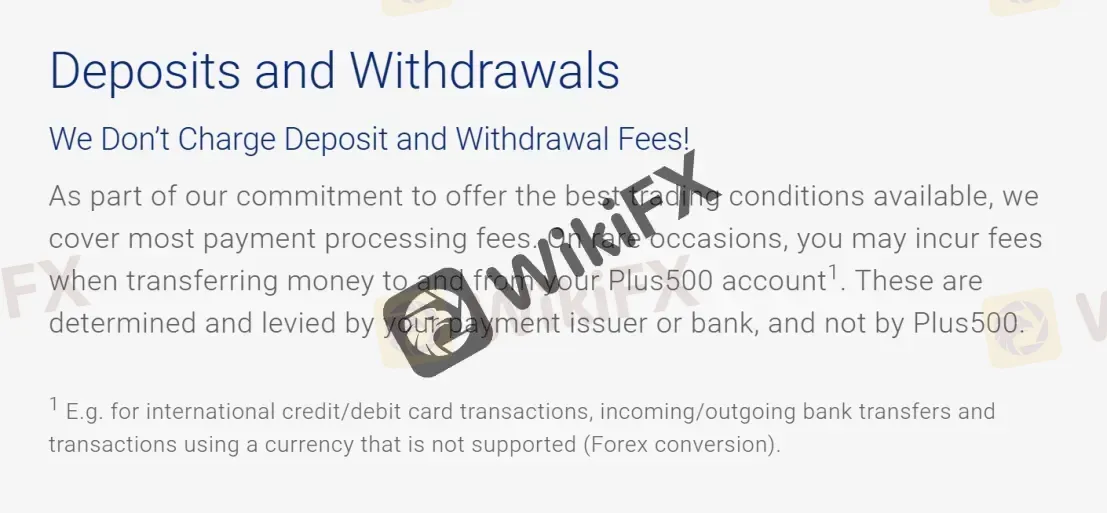
The minimum deposit requirement for Plus500 varies depending on the jurisdiction and the account type. In general, the minimum deposit ranges from $100 to $1,000. For example, in the UK, the minimum deposit is £100. In Australia, it is AUD 100, and in the EU, it is €100. It is recommended to check the specific minimum deposit requirement for your country and account type on the Plus500 website.
| Plus500 | Most other | |
| Minimum Deposit | $/€/£100 | $/€/£100 |
To withdraw funds from Plus500, you need to follow these steps:
Step 1: Log in to your Plus500 account and click on the “Funds Management” tab.
Step 2: Click on “Withdrawal” and select your preferred withdrawal method.
Step 3: Enter the amount you wish to withdraw and any additional information required for the withdrawal method you have chosen.
Step 4: Click on “Submit” to initiate the withdrawal process.
It is worth noting that Plus500 may require additional documentation or information to verify your identity before processing your withdrawal request. The processing time for withdrawals may also vary depending on your chosen withdrawal method.
Plus500 charges overnight funding fees for holding positions overnight. There are no fees for deposits and withdrawals, and inactivity fees only apply after three months of inactivity.

The overnight funding fee is a cost incurred for holding positions overnight and can be a credit or debit to your account depending on the direction of the position and the prevailing interest rates. The funding rate varies based on the instrument traded.
It is important to note that Plus500 may also charge additional fees for certain actions like guaranteed stop-loss orders or currency conversions.
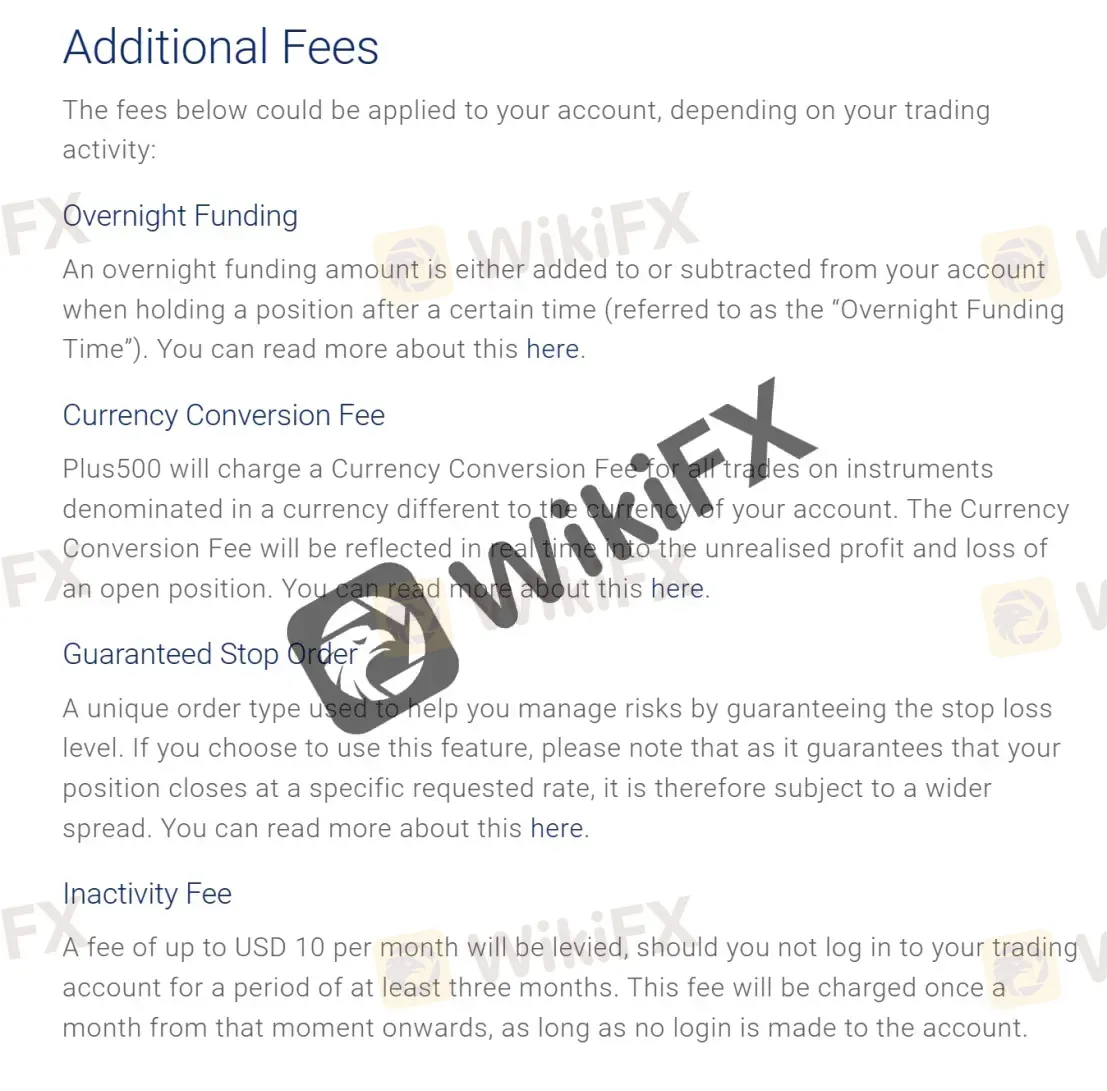
Overall, while the fees for Plus500 are relatively low, traders should be aware of the potential for higher overnight funding fees, as well as any additional fees that may apply for certain actions.
See the fee comparison table below:
| Broker | Deposit Fee | Withdrawal Fee | Inactivity Fee |
| Plus500 | Free | $5-$10 | $10/month |
| eToro | Free | $5 | $10/month |
| IG | Free | Free | $18/month |
| XM | Free | Free | $5/month |
| Pepperstone | Free | Free | $0 |
| IC Markets | Free | $3.5 | $0 |
Plus500 offers customer service through email, WhatsApp and live chat. The live chat is available 24/7, while email and WhatsApp support is available during business hours. Plus500 also provides an extensive FAQ section on their website, which covers many commonly asked questions about their services and trading platform.
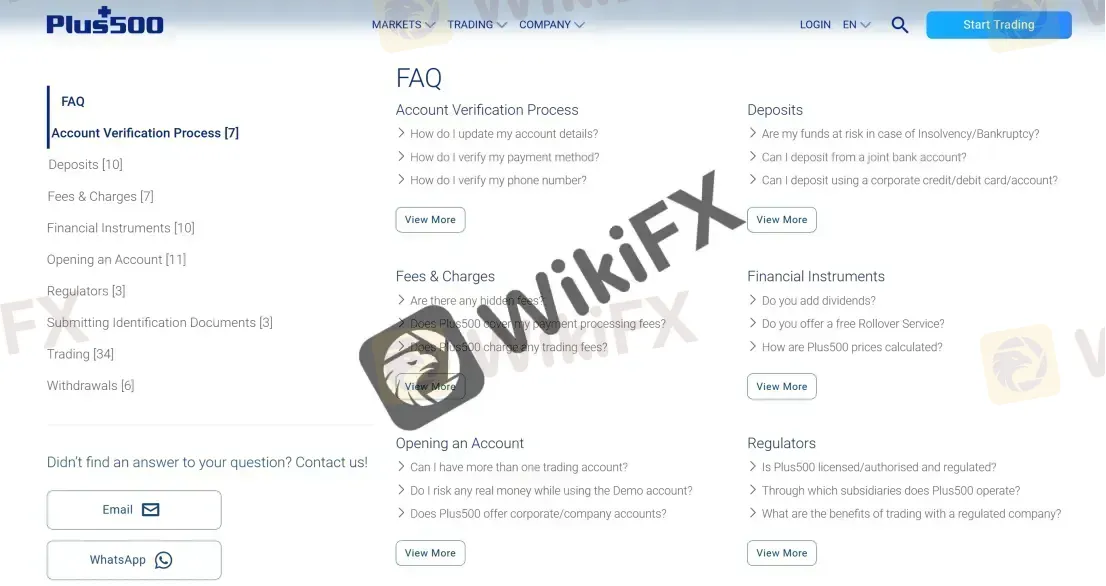
You can also follow Plus500 on some social networks such as Facebook, Twitter and Instagram.

Overall, Plus500's customer service is considered to be adequate, with prompt responses and helpful support staff. However, some users have reported difficulty reaching support during busy times or experiencing long wait times for responses to their queries.
| Pros | Cons |
| • 24/7 customer support via live chat | • No phone support available |
| • Multilingual support | • Sometimes response is not prompt |
| • User-friendly help center and FAQ section |
Note: These pros and cons are subjective and may vary depending on the individual's experience with Plus500's customer service.
Plus500 provides an educational section on their website, which includes video tutorials, a demo account, and a FAQ section. The educational resources cover topics such as trading basics, technical analysis, and risk management. However, the educational content is relatively limited compared to some other brokers and may not be sufficient for beginners looking to learn about trading.
Overall, Plus500 is a reputable and reliable online broker that offers a user-friendly trading platform, competitive spreads, and a wide range of trading instruments. It has a strong regulatory framework and offers various measures to protect its clients. Plus500 also provides excellent customer service with a 24/7 support team available via live chat.
However, Plus500 does have some drawbacks, such as limited educational resources, lack of a dedicated account manager, and a relatively high inactivity fee. Additionally, the broker's trading platform may not be suitable for advanced traders who require advanced charting tools and features.
In summary, Plus500 is an excellent option for beginner traders who are looking for a straightforward and easy-to-use trading platform with a low minimum deposit requirement. It is also a good choice for experienced traders who prioritize a strong regulatory framework and reliable customer service over advanced trading features.
| Q 1: | Is Plus500 regulated? |
| A 1: | Yes. Plus500 is regulated by FCA, CySEC, ASIC, FMA, and MAS. |
| Q 2: | Does Plus500 offer demo accounts? |
| A 2: | Yes. |
| Q 3: | Does Plus500 offer industry-standard MT4 & MT5? |
| A 3: | No. Instead, Plus500 offers its own proprietary trading platform (desktop, web, and mobile). |
| Q 4: | What is the minimum deposit for Plus500? |
| A 4: | The minimum initial deposit to open an account is $/€/£100. |
| Q 5: | Is Plus500 a good broker for beginners? |
| A 5: | Yes. Plus500 is a good choice for beginners because it is regulated well and offers various trading instruments with competitive trading conditions. Also, it offers demo accounts that allow traders to practice trading without risking any real money. |
To compare transaction costs across different brokers, our experts analyze the transaction-specific fees (such as spreads) and non-trading fees (such as inactivity fees and payment costs).
To get a comprehensive understanding of how cheap or expensive fxtm and plus500 are, we first considered common fees for standard accounts. On fxtm, the average spread for the EUR/USD currency pair is From 1.5 pips, while on plus500 the spread is --.
To determine the safety of our top brokers, our experts will consider many factors. This includes which licenses the broker holds and the credibility of these licenses. We also consider the history of brokers, because long-term brokers are usually more reliable and trustworthy than new brokers.
fxtm is regulated by CYSEC,FCA,FSC,FSCA. plus500 is regulated by ASIC,FSA,CYSEC,FCA,FMA,MAS.
When our experts review brokers, they will open their own accounts and trade through the broker's trading platform. This enables them to comprehensively evaluate the quality, ease of use, and function of the platform.
fxtm provides trading platform including ADVANTAGE PLUS,ADVANTAGE and trading variety including FX Metals Commodities Indices FX indices Stock baskets Stock CFDs (only MT5) Stocks (only MT5). plus500 provides trading platform including -- and trading variety including --.